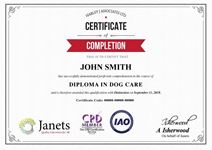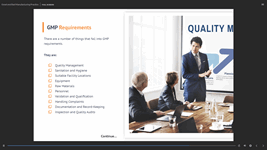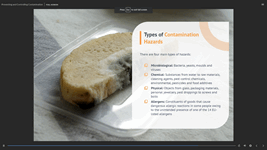
Good Manufacturing Practice (GMP)
FREE PDF Certificate | Audio Visual Learning | Tutor Support | 1 Year Access
Janets
Summary
- Tutor is available to students
Add to basket or enquire
Overview
If you are working in the food/drink manufacturing industry or are looking to step foot in the industry, this Good Manufacturing Practice course is just the right fit for you. Everyone who works in manufacturing, whether handling food directly or indirectly, needs to be aware of the procedures and practices that must be followed to ensure food safety.
♠ Get our premium course with a Free PDF Certificate at an unbelievable price♠
This Good Manufacturing Practice (GMP) training course gives learners a complete understanding of food hygiene methods unique to food manufacturing facilities, with an emphasis on the specific day-to-day processes in a food or drink plant.
Good Manufacturing Practices (GMP) define the standards for manufacturing a drug product in a specific country or region, and they cover topics including facility design and sanitation, product testing, product identification, equipment, packaging, warehousing and distribution, and recordkeeping.
Introduction to Good Manufacturing Practices includes a discussion of the pivotal events that have shaped UK laws on food, drugs, and cosmetics; the use of the terms GMP and cGMP (Current Good Manufacturing Practices); and how an organisation can remain compliant with these regulations in their day-to-day operations.
Learning Outcomes:
By the end of this course, learners should:
- Comprehend what GMP is and how it applies to food manufacturing enterprises.
- Be aware of excellent production techniques to follow and harmful manufacturing practices to avoid.
- Recognize the need of maintaining appropriate personal and workplace hygiene standards.
- Understand HACCP, its benefits, and how it contributes to food safety.
- Determine the proper methods for breakages, cleaning, and maintenance.
What You Get Out Of Studying With Janets
- Free PDF certificate upon successful completion of the course
- Full one-year access to course materials
- Instant assessment results
- Full tutor support available from Monday to Friday
- Study the course at your own pace
- Accessible, informative modules taught by expert instructors
- Get 24/7 help or advice from our email and live chat teams with the training
- Study at your own time through your computer, tablet or mobile device
- Improve your chance of gaining valuable skills by completing the course
Course media
Description
Good Manufacturing Practice (GMP) Course Curriculum:
Module 01: Basic Concept of GMP and Safety Regulations
- The Basic Concept of GMP
- Importance of GMP
- Safety Regulations and Consequences
Module 02: Good and Bad Manufacturing Practice
- GMP Requirements
- Quality Management
- Sanitation and Hygiene
- Suitable Facility Locations
- Equipment
- Raw Materials
- Personnel
- Validation and Qualification
- Handling Complaints
- Documentation and Record-Keeping
- Inspection and Quality Audits
Module 03: Preventing and Controlling Contamination
- Contamination Incidents
- Types of Contamination Hazards
- Microbiological Hazards
- Physical Hazards
- Chemical Hazards
- Allergenic Hazards
- Cross Contamination
- Detecting Contaminants
Module 04: Maintenance and Hygiene
- Maintaining Personal Hygiene
- Premises and Equipment
- General Area
- Production Area
- Storage Areas
- Quality Control Areas
- Equipment
- Infestation Control
Module 05: GMP for Pharmaceutical Industry
- ICH Guidelines for GMPs
- Quality Management System
- GMP Implementation for Excipient
- Excipient Quality Management Systems
- Management Responsibility
- Planning
- Responsibility, Authority and Communication
- Management Review
- Human Resources
Module 06: GMP for Food Industry
- Heat-Preserved Food
- Chilled Food
- Frozen Food
- Dry Food Products and Materials
- Compositionally Preserved Foods
- Export Goods
Module 07: GMP for Cosmetics Industry
- Importance of GMP Implementation
- GMP for Cosmetic Products
- How GMP Helps Entire Cosmetic Manufacturing Process
- Benefits of GMP for a Skincare or Cosmetics
- The Role of ISO 22716 in Cosmetic GMP
- An Overview of Cosmetic GMP Guidelines
- Documentation and Records
- Buildings and Facilities
- Complaints, Adverse Events, and Recalls
Module 08: IT Applications on GMP
- Differences between cGMP and GMP
- How Do the Standards Affect IT Systems?
- How Can You Stay Compliant?
- cGMP Factors for Successful Electronic Batch Records
Certification
All students who successfully complete the course can instantly download their free e-certificate. You can also purchase a hard copy of the course certificate, which will be delivered by post for £9.99.
Who is this course for?
Thecourse is ideal for those who are interested or already working in this sector.
Requirements
The course is open to all students and has no formal entry requirements.
Career path
As you complete this Good Manufacturing Practice (GMP) course, you could look into a variety of job possibilities, including the following:
- Production Operative
- Quality Control Analyst
- Batch Release Officer
- Process Technician
- Production Engineer
- Quality Officer
Entry-level positions provide an annual salary of £39,609 and more experienced staff usually earn about £58,875 in a year.
Questions and answers
Currently there are no Q&As for this course. Be the first to ask a question.
Reviews
Currently there are no reviews for this course. Be the first to leave a review.
Legal information
This course is advertised on reed.co.uk by the Course Provider, whose terms and conditions apply. Purchases are made directly from the Course Provider, and as such, content and materials are supplied by the Course Provider directly. Reed is acting as agent and not reseller in relation to this course. Reed's only responsibility is to facilitate your payment for the course. It is your responsibility to review and agree to the Course Provider's terms and conditions and satisfy yourself as to the suitability of the course you intend to purchase. Reed will not have any responsibility for the content of the course and/or associated materials.








